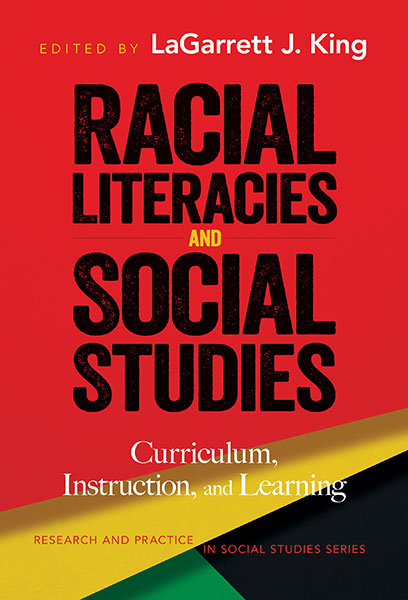Professors: Request an Exam Copy
Print copies available for US orders only. For orders outside the US, see our international distributors.
Edited by: LaGarrett J. King
Publication Date: October 28, 2022
Pages: 256
Series: Research and Practice in Social Studies Series

This volume collects the work of historians, researchers, and classroom teachers to define what it means to be a racially literate educator and citizen. History classes should be spaces in which all students learn about their predecessors’ legacies as a context for understanding and decision-making in contemporary society. In reality, the historical experiences of people of color are additive at best or marginalized at worst. To address the complexities of teaching and learning about race in the history classroom, chapter authors answer a series of questions related to curriculum, instruction, student learning, and teacher education: (1) how U.S. history narratives and curricular frameworks can or do incorporate the histories of racial/immigrant groups, (2) how teachers in particular contexts enact instruction that promotes and/or impedes students’ racial literacy, (3) what students learn or don’t learn from race lessons in history, and (4) how teacher educators can educate the next generation of teachers to become racially literate. Readers can use this resource to enable all young people to acquire the knowledge, skills, and dispositions necessary to critique the nation’s legacy of racial inequality, as well as understand the historical movements to disrupt inequality.
Book Features:
LaGarrett J. King is an associate professor of social studies education and director of the Center for K-12 Black History and Racial Literacy Education at the University at Buffalo Graduate School of Education. Dr. King received the 2022 National Council for the Social Studies Spirit of America Award.
“Racial Literacies and Social Studies is a call to action for teachers, school administrators, university faculty, and anyone committed to challenging power imbalances and racial hierarchies in schools and society. Edited by the country’s preeminent scholar on social studies and race, this book skillfully addresses intersectionalities of race and advances both research and praxis for a path forward toward an equitable world.”
—Christine Woyshner, professor of education, Temple University
“Racial Literacies and Social Studies provides a timely and insightful collection of essays that address many of the key issues impacting how we come to understand the durable grammar of race. The essays provide intellectual leadership that educators at all levels can draw from to inform their racial pedagogical content knowledge. Overall, this text is vital for encouraging us to both understand and act with regards to race and racism in order to arrive at a broader, more humanistic civic purpose.”
—Christopher L. Busey, associate professor, University of Florida
“Racial Literacies and Social Studies is a much-needed addition to the conversation about race at local, state, and national levels. Our curriculum, instruction, and profession depend upon developing racial literacy. This collection will help social studies educators and the broader community develop the necessary knowledge, language, and dispositions needed to identify and address racism in the past and present.”
—Ryan D. New, K–12 instructional lead for social studies, Jefferson County Public Schools
2022 National Council for the Social Studies Spirit of America Award, for LaGarrett King
Professors: Request an Exam Copy
Print copies available for US orders only. For orders outside the US, see our international distributors.